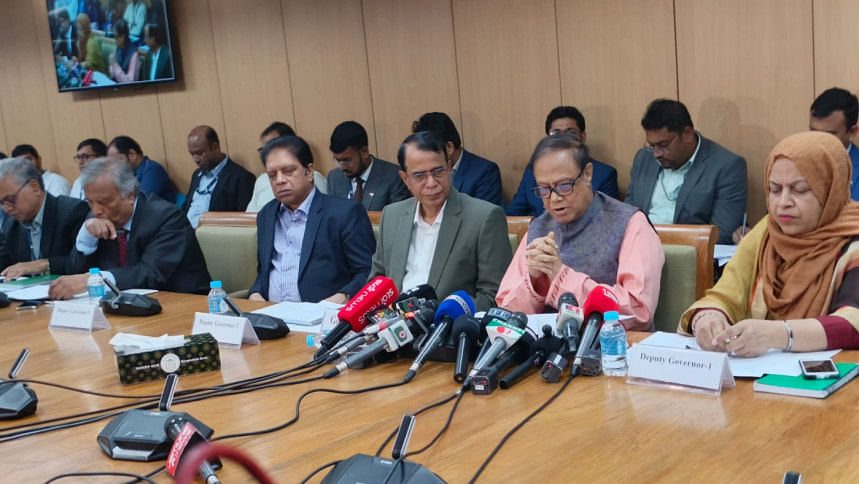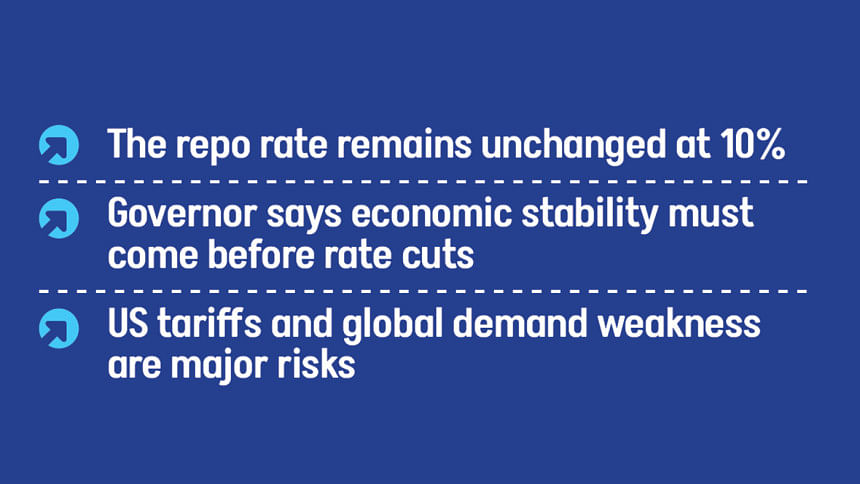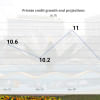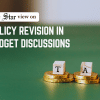Inflation, tariff risks keep Bangladesh on tight monetary path

Bangladesh Bank has held its key policy repo rate steady at 10 percent for the first half of the current fiscal year, reaffirming its commitment to a tight monetary stance aimed at curbing persistent inflation, weak private investment, and growing uncertainty over global trade.
"Until inflation comes below 7 percent, the policy repo rate will remain unchanged," the central bank said in its half-yearly monetary policy statement yesterday. It added that a downward adjustment may be considered later, if inflation eases and the real interest rate reaches a more sustainable level.
The repo rate is the rate at which banks borrow money from the central bank for short-term needs. The central bank uses the rate to control inflation by curbing the flow of money.
In the monetary policy statement, the central bank signalled flexibility in response to future external shocks. "If exports weaken due to tariff shocks and the weaker global growth outlook, accompanied by depreciation pressures, Bangladesh Bank will adjust the policy rate as needed to cushion the short-term impact while safely guiding its inflation objectives," it said.
After peaking at 11.66 percent in July 2024, inflation eased to 8.48 percent by June 2025, falling below 9 percent for the first time in over two years. However, the central bank remains cautious about underlying risks, especially from currency depreciation and the knock-on effects of US tariffs, warning that the "deceleration in inflation" may not be sustained.

Speaking at a press briefing, Governor Ahsan H Mansur underscored the central bank's policy philosophy. "Controlling inflation is crucial, and macroeconomic stability is a prerequisite for sustainable growth. You can boost growth artificially by printing money and increasing expenditure, but that's not sustainable," he said.
While food inflation has broadly moderated, the governor pointed out that rice prices have remained elevated. "Despite record production, rice prices are still rising, perhaps because affluent farmers are stockpiling. But we don't expect prices to rise much further," he said. He also noted a silver lining: "Farmers are happy because they're getting good prices at the farm level. So, there's a positive side to this, too."
Mansur credited market stability for recent inflationary relief. "We were able to manage the supply side. Currently, except for rice, most other prices in the market are stable. If we can maintain this situation, inflation will likely come down. We believe that if other countries can achieve this, Bangladesh can too," he said.
He outlined a long-term target for price stability: "Once inflation drops to single digits, lending rates will no longer be in double digits, and everything can be kept in real positive terms."
Private sector credit growth has slowed significantly, registering just 6.4 percent in June, the lowest in recent history, as tighter liquidity and elevated borrowing costs continue to bite. The governor acknowledged the strain being placed on businesses. "Those who took loans at 8-9 percent in 2016-17 are now paying 16 percent, despite being regular payers. It's unfortunate, but we can't artificially lower rates without restoring macro stability first," Mansur said.
GROWTH OUTLOOK
Although the economy grew by only 3.97 percent in FY25, well below initial projections, the central bank struck an optimistic tone on recovery prospects. The government has revised its FY26 growth target to 5.5 percent, broadly in line with forecasts from the International Monetary Fund, the World Bank, and the Asian Development Bank, which project growth between 4.9 percent and 5.4 percent.
Mansur defended the current growth rate in a regional context. "Our current growth rate is actually solid given the circumstances. In contrast, countries like Pakistan had negative growth. Our figures are clean, no manipulations," he said.
He expressed hope that political calm would continue to support investor sentiment. "We've survived the crisis, and now that stability is returning, investors will feel more confident, especially post-election, if the political environment stays stable," Mansur added.
The monetary policy statement highlighted emerging risks to the external sector, particularly from newly imposed US tariffs on Bangladeshi exports, especially ready-made garments. "A risk to sustaining export growth in the period ahead could emerge from new US tariffs imposed on Bangladeshi products, particularly on RMG products," the statement said.
With the United States being Bangladesh's largest export market, trade disruptions could dent earnings and add pressure to the exchange rate. Nonetheless, Bangladesh Bank reiterated its commitment to a fully flexible, market-based exchange rate regime, adding that it would intervene only to curb excessive volatility.
Gross foreign exchange reserves climbed to $26.7 billion by June 2025, buoyed by steady remittance inflows and modest export gains. "During the crisis, we focused on ensuring the availability of foreign exchange. Now, raw material imports have increased, so has production capacity. Exports are growing even without new investments," Mansur said.

 For all latest news, follow The Daily Star's Google News channel.
For all latest news, follow The Daily Star's Google News channel. 








Comments